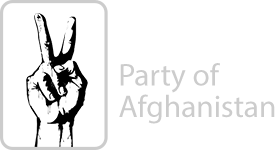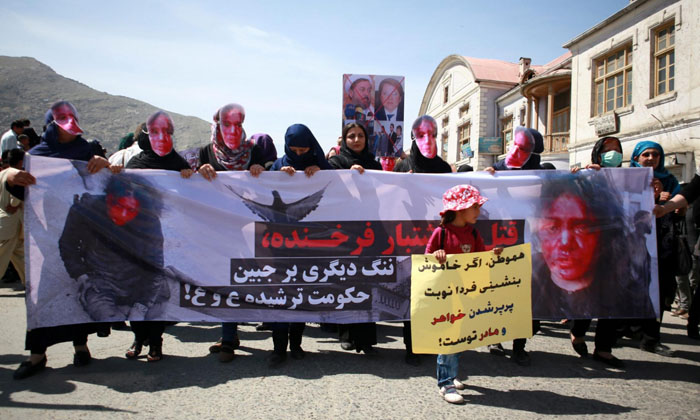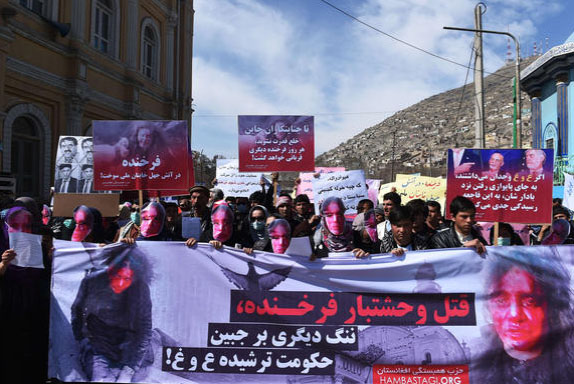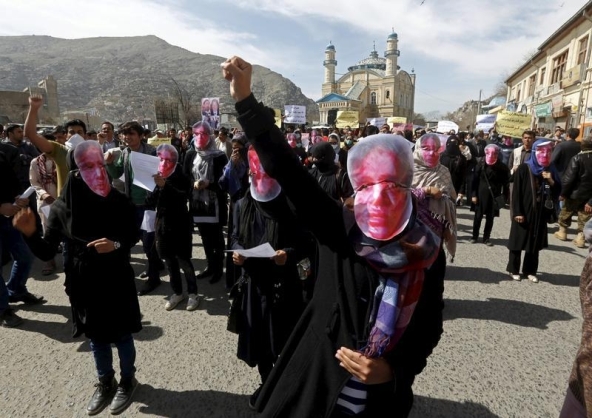Media Coverage of SPA Gathering to Seek Justice for Farkhunda
- Category: Party Documents
- Written by Solidarity Party of Afghanistan
- Published: Wednesday, 25 March 2015
Afghans demand justice for Farkhunda wrongly accused of burning the Koran and killed by mob
Source: The Telegraph; 23 Mar 2015
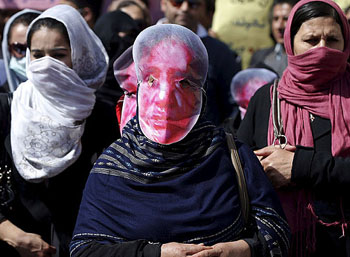
Protesters want justice for the Afghan scholar brutally killed as police say 13 policemen suspended amid allegations they did nothing to stop the attack
Hundreds of Afghans have protested in Kabul to demand justice for a woman who was killed by a mob outside one of the capital's most famous mosques.
The woman, a 28-year-old religious scholar named Farkhunda, was beaten, pushed from a roof, run over by a car and set alight before her body was thrown in the Kabul River last Thursday.
She was wrongly accused of burning the Koran was beaten with sticks, run over by a car, and burned to death by men. On Monday, Noorulhaq Ulumi, the interior minister, told MPs during questioning in parliament the accusation was "invalid".
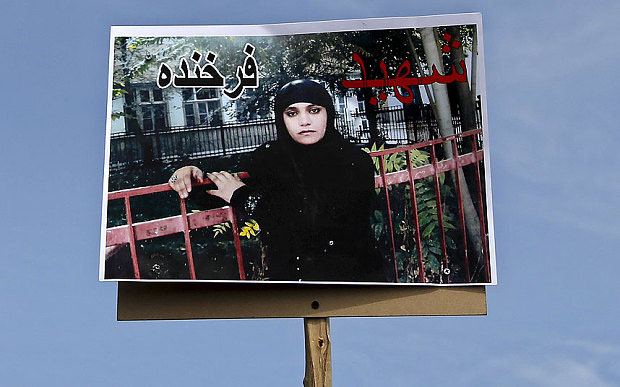
A picture of Farkhunda, an Afghan woman who was beaten to death and set alight on fire on Thursday, is seen during her funeral ceremony Photo: Reuters
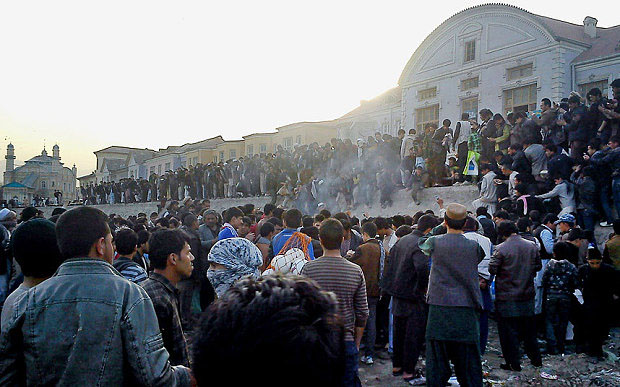
Afghan men gather around the body of Farkhunda (AP)
He said: "The accusation against her is completely invalid. Farkhunda was a religious girl, she was not involved [in burning the Koran], she was innocent.
"It is very painful that we were not able to protect a pious young person. We hope this will not be repeated again."
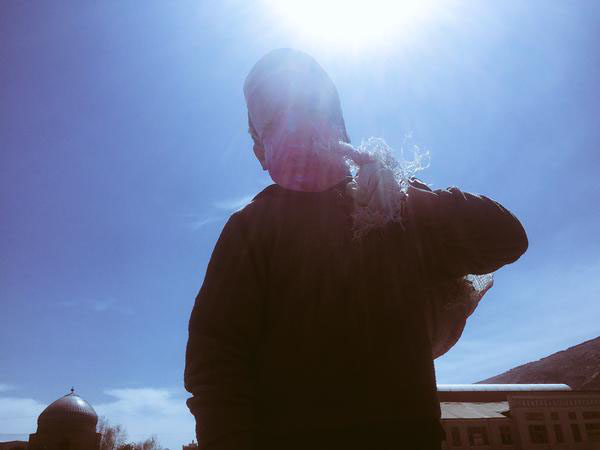
A little boy wears mask of Farkhunda at protest by Kabul River, where she was burned
She was buried and laid to rest by women amid a huge public outcry on Sunday. Her funeral drew hundreds onto the streets of Kabul.
"This is a crime against this family, a crime against a sister and a crime against humanity," said Bari Salam, a human rights activist.
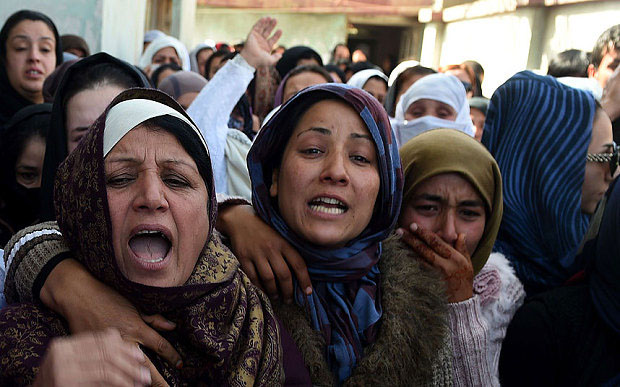
Relatives and family of Farkhunda wail at her home in central Kabul (AFP/Getty)
Protesters who gathered by the Shah Doshamshera mosque demanded the government prosecute all those responsible for the death of Farkhunda, who like many Afghans was known by only one name.
Police said they have arrested 13 people in relation to the incident, and suspended 13 policemen, including the police chief responsible for the area, amid allegations they stood by and did nothing to stop the attack.
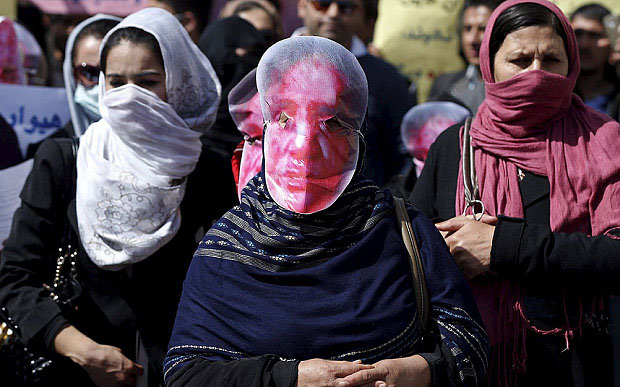
Afghans from the Hmbastagi party (Solidarity Party of Afghanistan) wear masks during a protest to condemn the killing (Reuters)
SPA Gathering to Seek Justice for Farkhunda in Euro News
Source: Euro News; 23 Mar 2015
Afghan woman lynched over Koran-burning was innocent: minister
Source: Times Live; 23 Mar 2015
An Afghan woman who was beaten to death and set on fire by a mob for allegedly burning a copy of the Koran was innocent, the interior minister said Monday.
The woman named Farkhunda was lynched on Thursday by an angry crowd in central Kabul for allegedly burning a copy of the Islamic holy book.
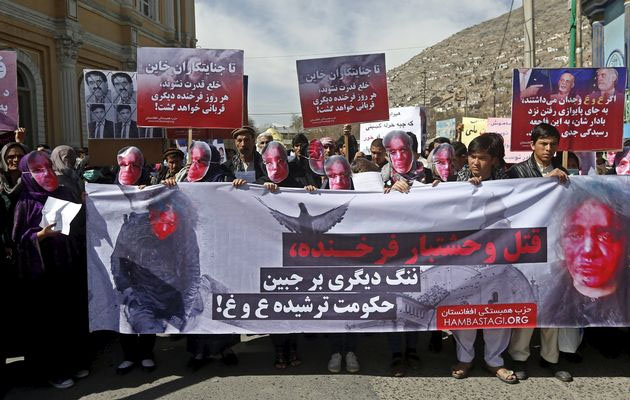
Afghans from the Hmbastagi party (Solidarity Party of Afghanistan) wear masks during a protest to condemn the killing of 27-year-old woman, Farkhunda, in Kabul. Image by: OMAR SOBHANI / REUTERS
"The accusation against her is completely invalid. Farkhunda was a religious girl, she was not involved (in burning the Koran), she was innocent," interior minister Noorulhaq Ulumi told MPs during questioning in parliament.
"It is very painful that we were not able to protect a pious young person. We hope this will not be repeated again."
Footage of the attack on social media shows several uniformed police watching as the crowd beat 27-year-old Farkhunda to death before burning her body, then dumping it into the Kabul river.
In a statement on Sunday the interior ministry said 13 police officers had been suspended, including the police chief responsible for the area. More than a dozen other people were arrested over the incident.
Scores of people protested against the lynching in Kabul on Monday, demanding the government bring the killers to justice.
The protesters marched in front of the mosque and along the river near where Farkhunda was beaten to death.
"We ask the government to detain and bring to justice every individual who was involved in the murder of Farkhunda," protester Maliha Akhawan told AFP.
Many women in the crowd wore masks bearing an image of Farkhunda's bloodied face that has been circulated on social media.
Farkhunda's body was carried to the graveyard by women amid crowds of men and laid to rest in Kabul on Sunday.
Allegations of Koran burnings have sparked violent incidents before in Afghanistan, a deeply conservative religious nation.
In 2012 the revelation that copies of the Koran had been burnt at the US-run Bagram prison sparked five days of violent anti-US riots and attacks across the country, in which 30 people died.
Farkhunda's murder reveals a nation that has changed
Source: Aljazeera English; 23 Mar 2015
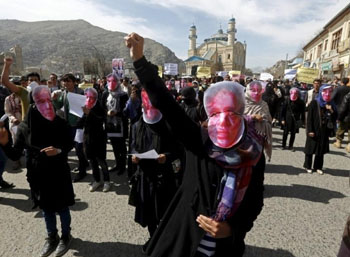
What killed Farkhunda was a failure to address the culture of violence and other post-traumatic issues in Afghanistan.
Farkhunda, a common name for girls in Afghanistan, means auspicious and jubilant. From last Thursday onwards, the name will evoke failure; failure of this war-ravaged society's leaders - and those of the international community - in healing its deeply damaged national psyche after three decades of war.
The 27-year-old Farkhunda, who was a student of religious studies, was brutally murdered two days before the Afghan new year, by an angry mob in front of one of Kabul's most venerated shrines when a mullah cried out that she had burnt the holy Quran.
What exactly happened before the crowd began its fatal assault, we will probably find out in the coming days. Video clips taken by mobile phones show her pleading with her assailants, saying that the accusation was a lie and that she did not burn the holy book. Nevertheless, she was beaten to death and her bloodied body was set on fire.
Calculated strategy
At a time when the atrocities of ISIL and Boko Haram make daily headlines, these disturbing images may not seem as shocking to the world. However, the crimes against humanity committed by those and other extremist militant groups are part of their calculated strategy of wreaking terror. They are considered enemies of civilization and as such, there is a global coalition fighting them.
The world has spent billions of dollars and thousands of lives in Afghanistan in the past 13 years to ensure that extremism would never again find a safe haven in this country. The global effort has given the Afghans roads, buildings, hospitals, schools and institutions. It has, however, completely ignored the psychological and moral damage that this nation has suffered as a result of prolonged conflict.
Some women activist groups have been quick to render Farkhunda as a symbol of abuses that Afghan women continue to suffer. In a highly untraditional act, Kabuli women carried her coffin on their shoulders.
"When I look at these men [in the cemetery], I see Farkhunda's killers," declared one woman during the burial yesterday. Social media posts are also projecting the incident as yet another example of a woman falling victim to the male-dominated mentality of Afghans.
But, Farkhunda was not brutally killed because she was a woman. True that she might have gained a little more time had she been a muscular man. She might have put up a fight or run a few metres before being murdered. Rather, the unfathomable tragedy is symptomatic of a more extensive, less tangible and far more alarming set of causes. She was accused of blasphemy by one deceptive mullah and attacked instantly by a pack of men who didn't stop for a moment to investigate. It all happened before the eyes of the police who was there to protect lives and apply the rule of law.
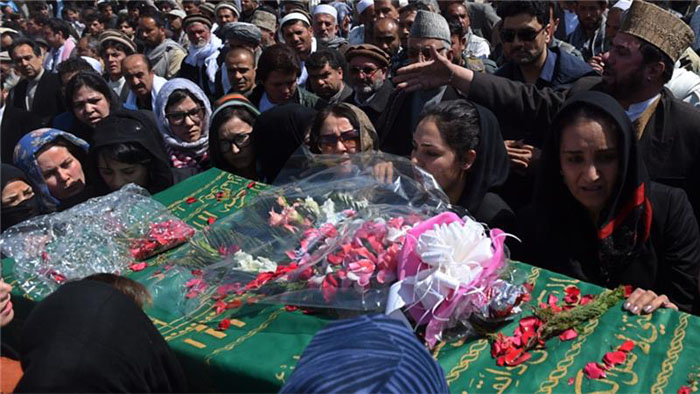
Afghan activist women carry the coffin of Farkhunda, who was lynched by an angry mob in central Kabul [AFP]
Not common criminals
Her attackers were not common criminals, nor a bunch of fanatic religious villagers. Most of them seem to be urbanite, well-groomed men in their twenties. They were born and raised in war. Their fathers had most probably lived most of their lives in war. The culture of violence, instilled over 3 decades, continues to be passed on to the young generation. Since the US-led international intervention of 2001, strongmen have thrived tremendously, having become financially rich and politically powerful. Using force and brutality, therefore, pays off.
Crime is rampant and goes mostly unpunished. Corruption among the police, prosecutors and judges has emboldened criminals and citizens have little faith in the rule of law. The lines between morality and immoral behavior, lawful and illegal acts and righteous and sinful deeds have blurred to the point that most people are not even aware of their wrongdoings.
This, however, has not happened overnight. Afghans are often praised for their resilience. In reality, they are a nation of survivalists. They are survivors of the communist regime's brutalities in the 1980s, the mujahideen's internecine wars of the early 1990s, the Taliban's draconian rule of the late 1990s, imprisonments, tortures, abject poverty, lack of education, miseries of refugee camps and loss of loved ones. They are damaged goods.
Since the international community decided to disengage from Afghanistan, a view of the Afghans as savage tribesmen trapped in the middle ages has become prevalent in the west. While on the surface, the Farkhunda incident confirms this opinion, those who remember the pre-war Afghanistan know that while it was a poor and under-developed country, there was dignity, tolerance and a code of honour. Afghans were always highly religious, but their Islam, heavily influenced by Sufi culture, was moderate and tolerant of the "other".
While there were far less schools and universities in the country compared to the number of educational institutions that have been build in the past decade with international aid, the quality of teachers and curricula were much higher. Discipline was strict and ethical conduct was emphasized. Humility and compassion were virtues; bullying and oppression censured. Acquiring knowledge, not power, was considered a noble endeavour.
Above all, the pre-war Afghan leadership always maintained moral authority and used it to implement the rule of law and reforms.
Survivalist mentality
This, of course, is not to say that Afghanistan of yore was a Utopia. Like any society, it had its share of criminals and morally corrupt individuals. Today's survivalist mentality, however, has no room for vital human virtues of compassion and tolerance. An archaic educational curriculum does not teach students to think and to use logic. Religious instruction at schools or at mosques indoctrinates the youth in an interpretation of Islam that fosters narrow-mindedness. Despondency has helped superstitious beliefs flourish.
So, what killed Farkhunda was the failure in adequately addressing several fundamental issues, including the culture of violence, a variety of frustrations and post-traumatic problems, a qualitatively inadequate education system, an unchecked religious establishment and an extremely weak rule of law.
Her callous murder will not be the last such incident if Afghan leaders and their international supporters do not reconsider overhauling the education system and seriously applying the rule of law. Farkhunda's murderers must be punished, but the work should not stop there. Constructing roads, buildings and institutions will not bring Afghanistan back to modernity, peace and stability. Investing in healing its people's deeply rooted psychological wounds would be the right place to start.
Family of Afghan woman lynched by mob take comfort from tide of outrage
Source: The Guardian; 23 Mar 2015
Father of a 27-year-old woman who was murdered by a mob in Kabul last week has witnessed a very public response to his daughter’s death.
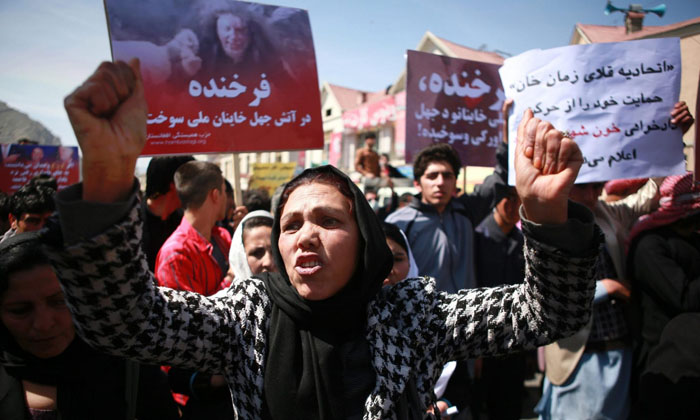
Activists protest against the killing of Afghan woman Farkhanda, in Kabul, by an angry mob. Photograph: Hedayatullah Amid/EPA
Afghan woman, Farkhunda, lynched over Koran-burning was 'innocent', interior minister says
Source: Radio Australia; 23 Mar 2015
An Afghan woman who was beaten to death and set on fire by a mob for allegedly burning a copy of the Koran was "innocent", Afghanistan's interior minister says.
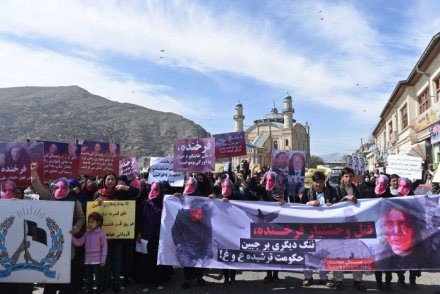
Afghan members of the Solidarity Party of Afghanistan protest the attack by wearing masks bearing an impression of the bloodied face of the woman who was lynched. (Credit: AFP)
The woman named Farkhunda was lynched on Thursday by an angry crowd in central Kabul for allegedly burning a copy of the Islamic holy book.
"The accusation against her is completely invalid. Farkhunda was a religious girl, she was not involved [in burning the Koran], she was innocent," interior minister Noorulhaq Ulumi told MPs during questioning in parliament.
"It is very painful that we were not able to protect a pious young person. We hope this will not be repeated again."
Footage of the attack on social media shows several uniformed police watching as the crowd beat 27-year-old Farkhunda to death before burning her body, then dumping it into the Kabul river.
In a statement on Sunday, the interior ministry said 13 police officers had been suspended, including the police chief responsible for the area. More than a dozen other people were arrested over the incident.
Scores of people protested against the lynching in Kabul on Monday, demanding the government bring the killers to justice.
The protesters marched in front of the mosque and along the river near where Farkhunda was beaten to death.
"We ask the government to detain and bring to justice every individual who was involved in the murder of Farkhunda," protester Maliha Akhawan told AFP.
Many women in the crowd wore masks bearing an image of Farkhunda's bloodied face that has been circulated on social media.
Farkhunda's body was carried to the graveyard by women amid crowds of men and laid to rest in Kabul on Sunday.
Her father said his daughter had a diploma in Islamic studies and could recite the Koran by heart, insisting she was not involved in burning the Muslim holy book.
Allegations of Koran burnings have sparked violent incidents before in Afghanistan, a deeply conservative religious nation.
In 2012 the revelation that copies of the Koran had been burnt at the US-run Bagram prison sparked five days of violent anti-US riots and attacks across the country, in which 30 people died.
Afghans demand justice for woman beaten to death by mob, set on fire
Source: The Virginia Gazette; 23 Mar 2015
Woman killed by mob in Kabul over Koran was innocent: investigator
Source: Reuters; 23 Mar 2015
26 people arrested over horrific murder of Afghan woman who was beaten to death and then set on fire for 'burning the Koran'
Source: Mail Online; 23 Mar 2015
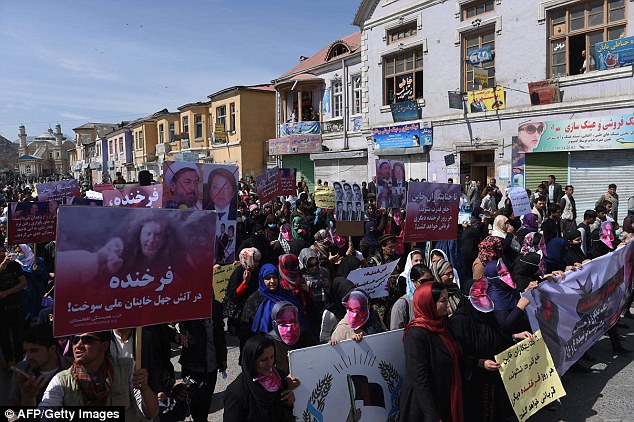
Afghan members of the Solidarity Party of Afghanistan wearing masks bearing an impression of the bloodied face of Farkhunda
